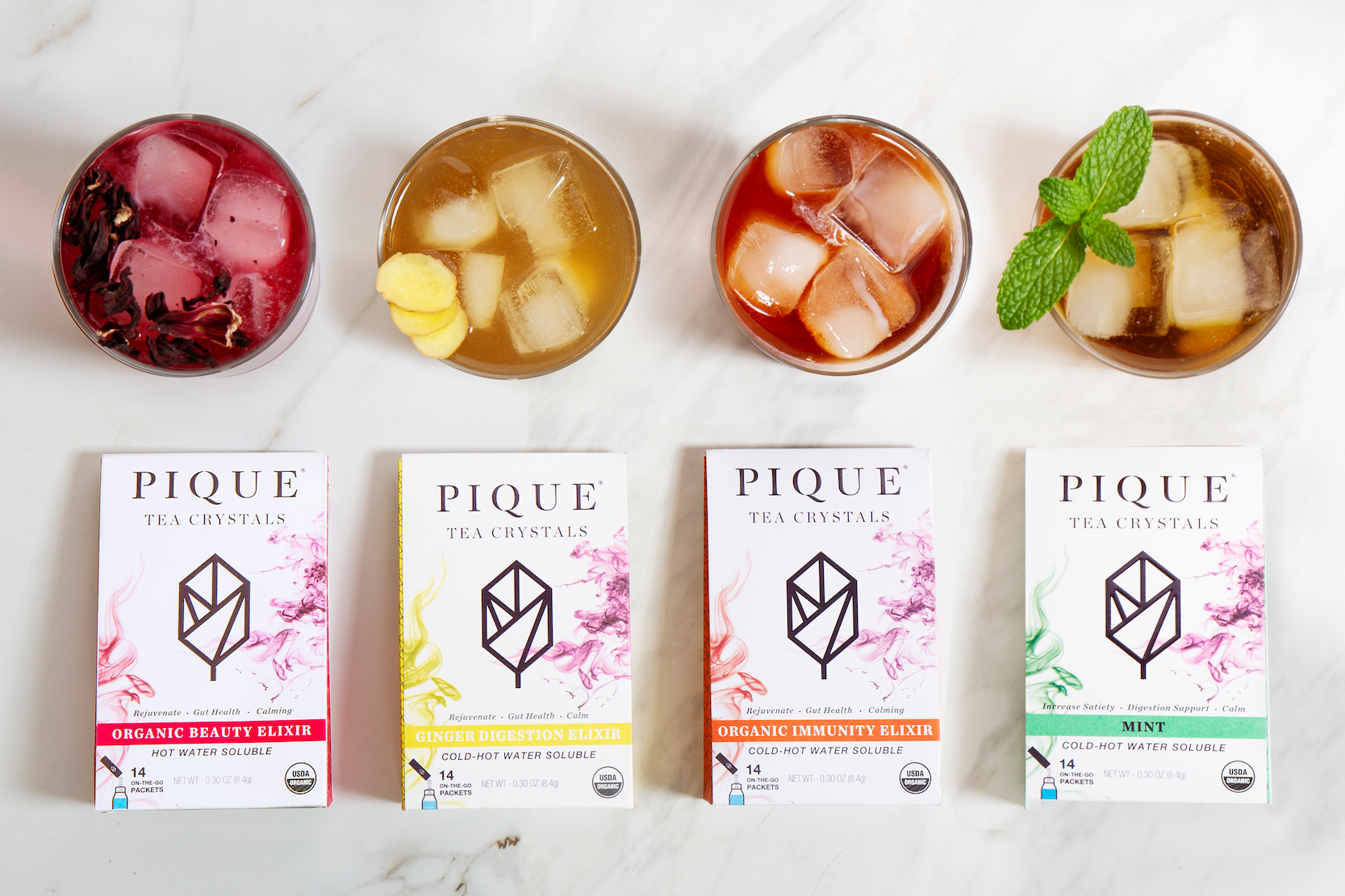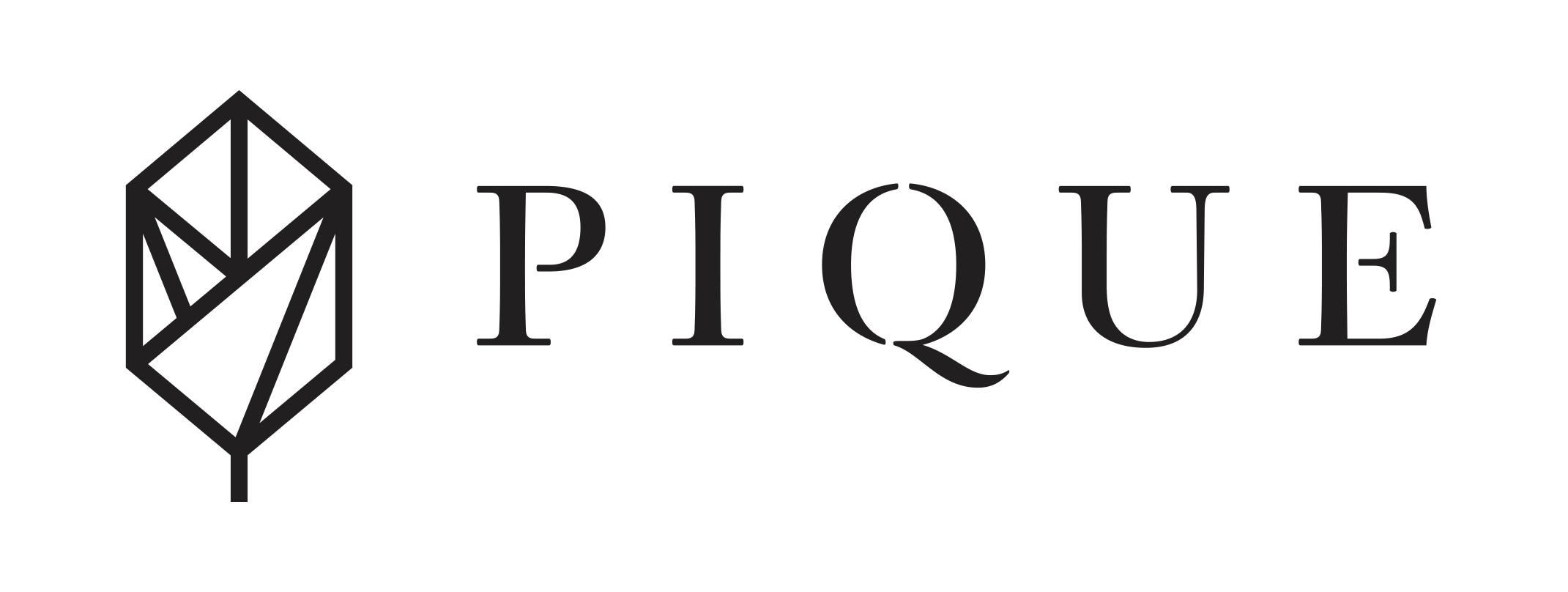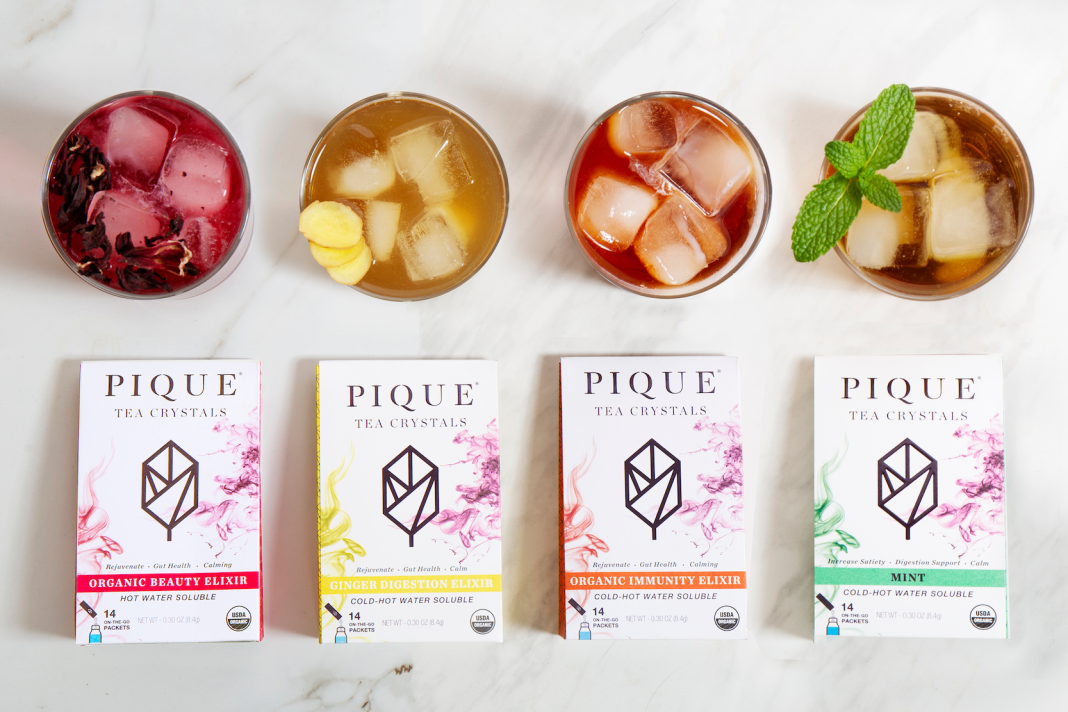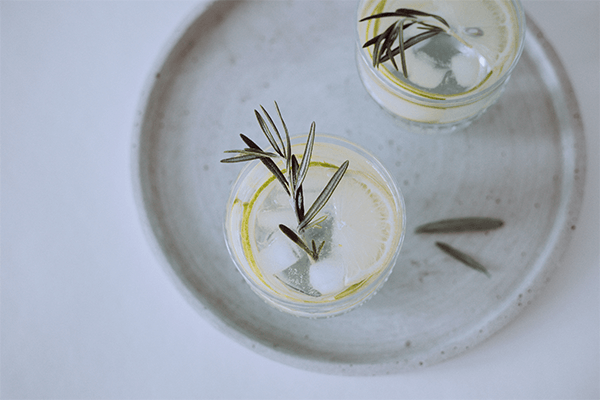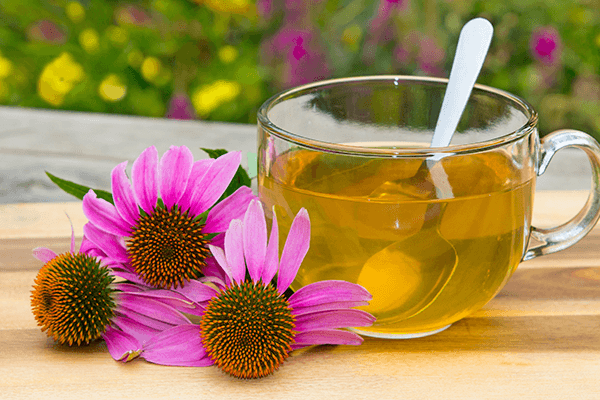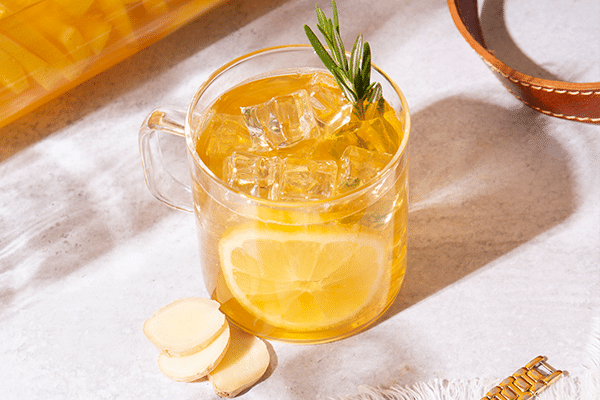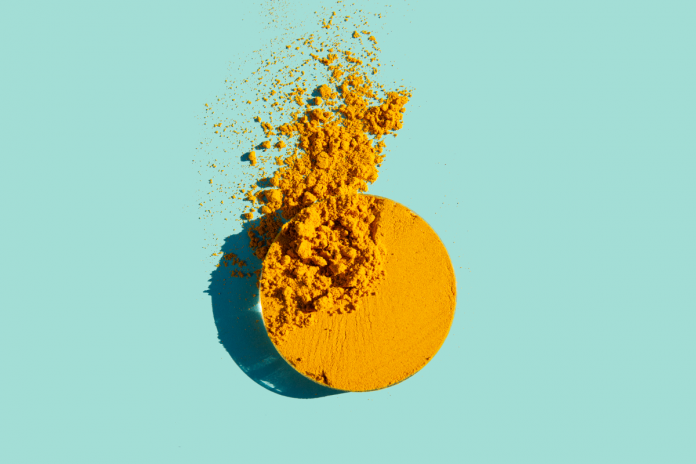We all know the energy-boosting benefits of caffeine. This stimulant can help you stave off sleepiness, stay focused, and feel more alert. Caffeine-containing beverages are great to help us wake up and perk up, but too much of a good thing can of course be bad.
Anything more than 300 or 400 milligrams of caffeine, or the amount found in about two strong coffees — can cause jitters, anxiety and rapid heartbeat. Consumed later in the day, it can also disrupt your natural sleep cycle… which makes you feel more tired, which makes you want more caffeine, etc, etc.,
If you’ve found yourself stuck in this cycle of caffeine dependency, or simply want to cut back, you’re probably looking for an alternative to your normal cup of English breakfast tea or Earl Grey. This article will break down your options and the health advantages of switching to a caffeine-free tea.
What teas have no caffeine?
All “true” teas that come from the Camellia sinensis plant — black, pu’er, oolong, green and white tea — naturally contain caffeine, albeit in different levels. Some varieties, like an aged Pu-erh tea, can contain as little as 25-30mg caffeine per cup of tea. But others, like good quality Assam black tea, can deliver 90 or 95mg per cup — about the same as coffee.
Caffeine level varies depending on the leaves’ age and the way they were processed. It can also be impacted by brewing technique — longer brews in very hot water typically will extract more of this bitter stimulant than a shorter steeping. Ultimately, it’s difficult to know for sure the amount of caffeine you’re getting in every sip.
Teas with no caffeine are actually not teas at all but tisanes — herbal tea made from dried flowers, herbs, leaves, seeds, or roots that include no true tea leaves. Chamomile, peppermint, hibiscus, ginger, dandelion, rooibos, elderberry, turmeric and chai tea blends (without black tea) are all great choices that offer a range of flavor experiences for the true tealover.
If you’re really hooked on the flavor of black or green tea, you may prefer a decaffeinated version, which plenty of commercial tea companies produce. But there are a few misconceptions around decaf tea to clear up first.
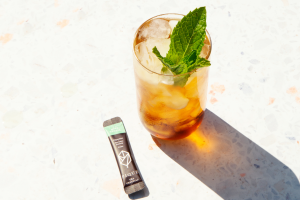
Is decaffeinated tea really caffeine-free?
It’s important to distinguish between the terms “decaffeinated” and “caffeine-free.”
Decaffeinated tea refers to true tea leaves that have been processed to remove that naturally-occurring caffeine. However, it’s nearly impossible to completely eliminate the compound. The level may be drastically reduced, but decaffeinated tea is not totally “free” of caffeine.
Regulations stipulate that anything labeled “decaf” must contain no more than 3% of its original caffeine content – not 0%. Though the remaining caffeine may be scant enough to have no effect on most people, this level may still be too high for tea drinkers who are very sensitive to the effects of caffeine.
“Caffeine-free,” on the other hand, means there is absolutely no caffeine present. Caffeine-free teas would include those herbal varieties mentioned above. Luckily, there are so many varieties of herbal tea, you’ll never run out of options!
Is drinking decaffeinated tea good for you?
The type of decaffeinated tea you choose matters. There are two primary processes that commercial manufacturers use to strip true teas of their natural caffeine, and some are safer than others.
Certified organic tea makers treat leaves with carbon-dioxide-infused water in high pressure tanks to neutralize the caffeine – a method with no known adverse effects. Other companies, however, use chemical solvents like ethyl acetate or methylene chloride.
Ethyl acetate is derived from fruit and is therefore considered “natural,” but evidence suggests that high doses can nonetheless harm the central nervous system, liver and kidneys. It’s unlikely that the ethyl acetate left over on decaffeinated tea leaves would meet a dangerous threshold, and this substance is considered safe by the FDA, but it’s nonetheless a risk factor regular tea drinkers should be aware of. [1]
Methylene chloride, on the other hand, is a greater cause for concern. This chemical is also found in paint removers, pharmaceuticals, and aerosols, and is considered a potential carcinogen by OSHA, the federal agency for occupational health and safety. Like many potentially harmful additives, the FDA permits it in small amounts. [2] But again, small amounts can add up over time if you plan to consume decaffeinated tea daily.
The FDA also does not regulate how tea makers decaffeinate their tea — meaning the levels of any chemicals used are not monitored and any residue left over on finished tea leaves is not measured. It’s impossible to know just how much of these additives you are consuming with every cup.
To completely avoid the risks associated with these chemicals, the best course of action is to opt for herbal teas that naturally contain no caffeine.
Are Herbal Teas Healthy?
The specific health benefits of herbal teas will vary depending on their ingredients, but since all are made from plants, they will contain a variety of polyphenols and antioxidants, which have been shown to confer a range of protective benefits.
Consumption of antioxidants has been associated with reduced risk for a variety of ills, and support for overall health. Diets rich in antioxidants may also help to support healthy weight management, a healthy immune system, and healthy blood sugar levels. [3][4][5][6][7]. Part of a healthy and balanced diet, herbal teas can help to support overall wellness as much as any true tea.
So while you may miss out on L-theanine and epigallocatechin gallate (EGCG) prevalent in true teas, you will still reap the benefits of powerful plant compounds without any exposure to caffeine.
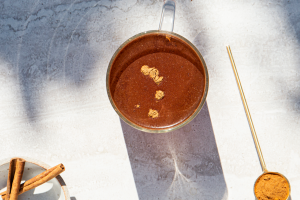
What are the best caffeine-free teas?
Choosing a caffeine-free tea really depends on your flavor preference, time of day and desired health benefits. Below are five recommendations to get your herbal tea collection started. Whenever possible, opt for loose leaf tea over tea bags for better flavor.
-
Hibiscus Tea
Good for: Hibiscus tea is high in antioxidants and contains flavonoids shown to support healthy blood pressure levels. [12][13][14].
It’s also a good source of vitamin C. Phytochemicals called anthocyanins, the same compounds that give blackberries, blueberries, and raspberries their color, are thought to be responsible for hibiscus tea’s heart-healthy properties.
Flavor profile: This flower imparts a tart flavor with some sweet undertones that many find pleasant on its own, but that is also complemented well by a tablespoon of honey. It also makes a divinely refreshing iced tea.
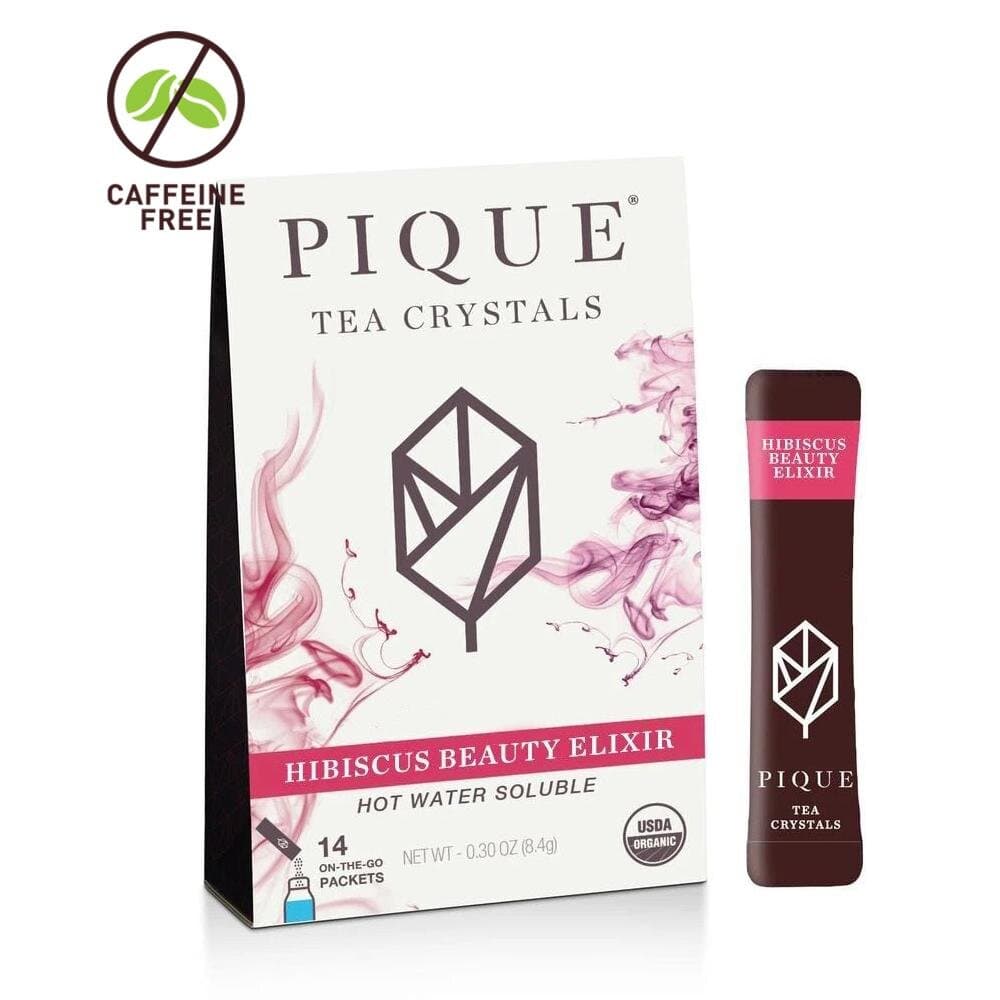
Pique Hibiscus Beauty Elixir
Like a rosy-cheeked glow that’ll have you feeling flirty. Revitalizing and caffeine-free. Make your cells dance.
-
Chamomile
Good for: Relaxation and calming effects. Chamomile has been shown to help induce feelings of calm, which may be helpful in managing stress or preparing the body for sleep. For that reason it’s best enjoyed at night.
Flavor profile: Loose leaf chamomile tea delivers a soft, floral flavor with a faint fruity note of apple. It’s a very neutral flavor well-suited to its calming properties.
-
Ginger tea
Good for: Digestion and soothing tummy troubles. Ginger is known to help neutralize nausea and supports a healthy gastrointestinal function. Best drunk in the morning to kickstart your digestive system.
Flavor profile: A warming spice, ginger has a bit of a kick that pairs well with cinnamon, cardamom and cloves. Look for a caffeine-free chai blend with no black tea to get this cozy combo. Ginger and lemon in another popular combination; lemon’s acidity helps to cut ginger’s spice and make the entire brew a little sharper.
-
Peppermint Tea
Good for: Focus and alertness. Several studies support the effectiveness of mint in supporting overall cognitive function and brain health, including improved working memory. If you need a little pick me up in the afternoon when that 3 p.m. slump hits, mint may be just what you need.
Flavor profile: This depends on whether you opt for peppermint (a bit spicier and bolder) or spearmint (a tad sweeter and more subtle), but both will pack a clean, fresh menthol punch.
-
Rooibos Tea
Good for: Rooibos tea is free of tannins and so mild and gentle on the stomach, people in South Africa (where it originates) have been giving it to colicky babies for generations. Rooibos’ biggest claim to fame is its unique antioxidant content. It contains at least two health-enhancing compounds (aspalathin and alpha hydroxy acid) that do not exist in any other natural source that you can ingest. It’s also the only tea that provides quercetin, a powerful weapon against fighting free radicals in the body.
Flavor profile: Rooibos has an earthy, robust flavor reminiscent of vanilla
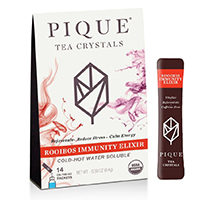
Pique Rooibos Vitality Elixir
Powerhouse of unique plant nutrients. Earthy, caffeine-free and low in tannins. Ideal for sensitive tummies.
A Note on Tea Crystals:
To maximize the health benefits of caffeine-free herbal tea, you may want to check out tea crystals. Throughout the drying, packaging, shipping and even brewing process, tea leaves of all kinds lose some of their antioxidant capacity.
Tea crystals, on the other hand, are made using a cold-brew crystallization process that preserves as many polyphenolic compounds as possible, delivering both maximum health benefits and flavor. These are an ideal option if you don’t have the time or equipment to brew loose leaf tea, or are in the mood for iced tea, and want to get as many of those antioxidants as possible!
